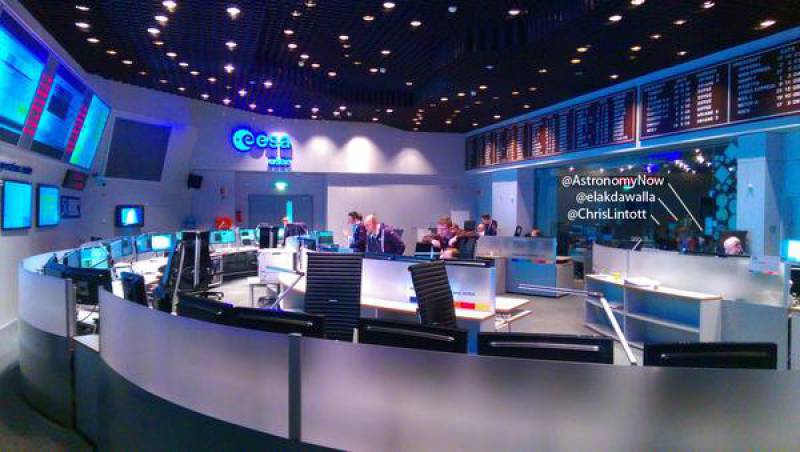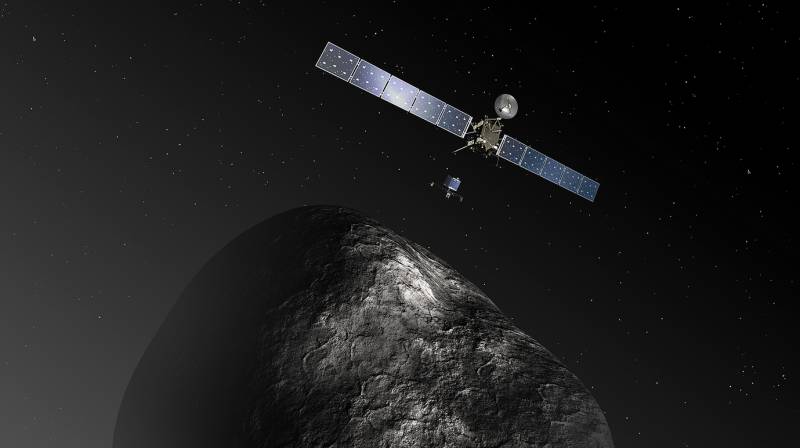 I’ve just about recovered from my trip to Darmstadt, just outside Frankfurt, which was home to mission control for the recent landing of the tiny and now ‘sleeping’ Philae lander onto the surface of Comet Churyumov-Gerasimenko. One of the joys of covering a European mission is the variety of accents and backgrounds involved; just as the lander had legs built in England and electronics from Hungary, so the team ranged from London-raised Matt Taylor (he of the shirt) to Italian flight director Andrea Accomazzo. This was a truly European mission, and as speaker after speaker at press conference after interview talked about ‘Europe’, ‘Europe’ and ‘Europe’ I wondered how this must look to the outside world.
I’ve just about recovered from my trip to Darmstadt, just outside Frankfurt, which was home to mission control for the recent landing of the tiny and now ‘sleeping’ Philae lander onto the surface of Comet Churyumov-Gerasimenko. One of the joys of covering a European mission is the variety of accents and backgrounds involved; just as the lander had legs built in England and electronics from Hungary, so the team ranged from London-raised Matt Taylor (he of the shirt) to Italian flight director Andrea Accomazzo. This was a truly European mission, and as speaker after speaker at press conference after interview talked about ‘Europe’, ‘Europe’ and ‘Europe’ I wondered how this must look to the outside world.
 In truth I think it’s obvious that ESA has always defined itself in opposition to NASA. Arguably until last week ESA’s greatest success was Giotto, which carried out a close flyby of Comet Halley when it last passed through the inner Solar System in 1986.
In truth I think it’s obvious that ESA has always defined itself in opposition to NASA. Arguably until last week ESA’s greatest success was Giotto, which carried out a close flyby of Comet Halley when it last passed through the inner Solar System in 1986.
This is the closest ESA’s ever had to a spacerace, I suspect, and it led to plenty of enthusiasm for a new, more ambitious mission to a comet. Giotto had thrown up several surprises, including the fact that the nucleus of the comet was much darker than expected – more icy dirtball than dirty snowball. The original proposal had been international, and supremely ambitious – led by NASA and ESA, the aim was not only to go to a comet and land on it but to return a sample to Earth. This wasn’t to be: NASA pulled out of the proposed mission in the early 1990s.
Still glowing from Giotto’s success, ESA really wanted to go alone; after all, comets were now ‘Europe’s thing’. Rosetta could simply compensate for the lack of samples brought safely back to Earth by taking a chemistry lab to the comet instead of vice versa. There are other examples of European leadership – the Gaia satellite, currently mapping a billion or so stars to uncover the history of the Milky Way extends a long ESA tradition of stellar cartography.
But the agency hasn’t always come off well from other direct comparisons. Planck – a mission to study the cosmic microwave background – has provided the definitive set of observations of this ancient light, but in truth much of its thunder was stolen by WMAP, a smaller NASA probe proposed, selected, constructed and deployed while ESA was still working on Planck. And back in the Solar System, ESA’s Mars Express despite doing good science, has always been overshadowed by NASA’s rovers (and an orbiting spacecraft, Mars Reconnaissance Orbiter, which has a superb camera).
Actually, I’m sure Mars Express was on ESA’s mind during much of the planning for this month’s landing; much of the publicity that could have come from ‘Europe’s first Mars orbiter’ was swamped by the abject failure of the British Beagle 2, a high risk hitchhiker that many in the agency would have preferred to leave behind. Had Philae failed, selling Rosetta as a triumph would have been much harder. No matter that the scientific return from a mission consisting only of the Rosetta mothership would have been enormous, a failed landing on the global stage would have been disastrous for Europe’s image – and ESA knew it. Hence the rhetoric about European success.
And yet the whole thing felt rather like ESA had an older, more successful sibling. The agency itself turned to senior NASA personnel to explain how impressive all of this was, and the press tended to follow. The BBC’s Newsnight, a very high profile political program (for whom I reported on the day of the landing itself), took the story in a different direction on day two by interviewing Buzz Aldrin and a NASA deputy administrator about NASA’s plans to go back to Mars. This seemed utterly bizarre to me – there wasn’t a mention of the future plans of ESA – and reflected a sense that nothing in space could possibly be worth doing unless NASA were impressed. At the same time we were celebrating an unabashedly European success, what I described elsewhere as a cultural cringe was setting in.
Of course, there’s a political dimension to everything, even a landing on a dirty snowball some three hundred million miles away. The idea of ‘Europe’ is a live issue across most of the continent. Support for the European Union is at an all time low; nearly a third of the seats in recent European Parliament elections went to parties that in one way or another question the whole enterprise. (Ironically, European politics may have doomed Philae – primarily as a matter of environmental policy ESA hasn’t invested in the kind of radioisotope heater that powers Curiosity, hence the slightly quixotic dependence on solar power in the outer solar system.)
But for many of the cosmopolitan scientists supported by ESA (I’m writing this in Luxembourg after a meeting for an EU funded project), this was a way of demonstrating very publicly that ‘Europe’ could do something together. And several of the leaders and comment pieces in the broadsheet UK press picked up on this Jonathan Friedland, in an extraordinary and quite wonderful piece, explained that Philae had proved ‘that Europe is not dead yet.’
————-
I moved to Italy about a year and a half ago and I live not far from World War I trenches. I’m a short bus ride from the Memorial at Redipuglia, a hillside transformed into an enormous tomb for the remains 100,000 Italian WWI soldiers, most of them unidentified. And the city where I live, Trieste, has Italy’s only concentration camp and was right on the edge of the Iron Curtain.
Your enthusiasm for Europe makes perfect sense to me. Ever since moving here and getting a first-hand sense of Europe’s history — all that suffering and horrors that these countries inflicted on one another — it seems outright amazing that the EU, the Eurozone, the Schengen Area exist at all. It really is an incredible accomplishment in rising above resentment and one of the best things to come out of recent history. I hope it all manages to keep together for a long time.